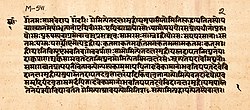| Chandogya | |
|---|---|
 The Chandogya Upanishad verses 1.1.1-1.1.9 (Sanskrit, Devanagari script) | |
| Devanagari | छान्दोग्य |
| IAST | Chāndogya |
| Date | 8th to 6th century BCE |
| Type | Mukhya Upanishad |
| Linked Veda | Samaveda |
| Chapters | Eight |
| Philosophy | Oneness of the Atman |
| Commented by | Adi Shankara, Madhvacharya |
| Popular verse | Tat tvam asi |
| Part of a series on |
| Hindu scriptures and texts |
|---|
 |
| Related Hindu texts |
The Chandogya Upanishad (Sanskrit: छान्दोग्योपनिषद्, IAST: Chāndogyopaniṣad) is a Sanskrit text embedded in the Chandogya Brahmana of the Sama Veda of Hinduism.[1] It is one of the oldest Upanishads.[2] It lists as number 9 in the Muktika canon of 108 Upanishads.[3]
The Upanishad belongs to the Tandya school of the Samaveda.[1] Like Brihadaranyaka Upanishad, the Chandogya is an anthology of texts that must have pre-existed as separate texts, and were edited into a larger text by one or more ancient Indian scholars.[1] The precise chronology of Chandogya Upanishad is uncertain, and it is variously dated to have been composed by the 8th to 6th century BCE in India.[2][4][5]
It is one of the largest Upanishadic compilations, and has eight Prapathakas (literally lectures, chapters), each with many volumes, and each volume contains many verses.[6][7] The volumes are a motley collection of stories and themes. As part of the poetic and chants-focussed Samaveda, the broad unifying theme of the Upanishad is the importance of speech, language, song and chants to man's quest for knowledge and salvation, to metaphysical premises and questions, as well as to rituals.[1][8]
Chandogya Upanishad is one of the most cited texts in later Bhasyas (reviews and commentaries) by scholars from the diverse schools of Hinduism, with chapter six verse 8-16 containing the damous dictum Tat Tvam Asi, "that('s how) you are."[9] According to Deutsch and Dalvi, "the entire sixth chapter is no doubt the most influential of the entire corpus of the Upanishads."[10]
- ^ a b c d Patrick Olivelle (2014), The Early Upanishads, Oxford University Press; ISBN 978-0195124354, pp. 166-169
- ^ a b Cite error: The named reference
stephenphillipswas invoked but never defined (see the help page). - ^ Paul Deussen, Sixty Upanishads of the Veda, Volume 2, Motilal Banarsidass, ISBN 978-8120814691, pages 556-557
- ^ Cite error: The named reference
olivelleintrowas invoked but never defined (see the help page). - ^ Rosen, Steven J. (2006). Essential Hinduism. Westport, CT: Praeger Publishers. p. 125. ISBN 0-275-99006-0.
- ^ Cite error: The named reference
klauswitzwas invoked but never defined (see the help page). - ^ Cite error: The named reference
humefullwas invoked but never defined (see the help page). - ^ Paul Deussen, Sixty Upanishads of the Veda, Volume 2, Motilal Banarsidass, ISBN 978-8120814691, pages 61-65
- ^ Olivelle 2008, p. 152, 349 n.8.7-16.3.
- ^ Deutsch & Dalvi 2004, p. 8.